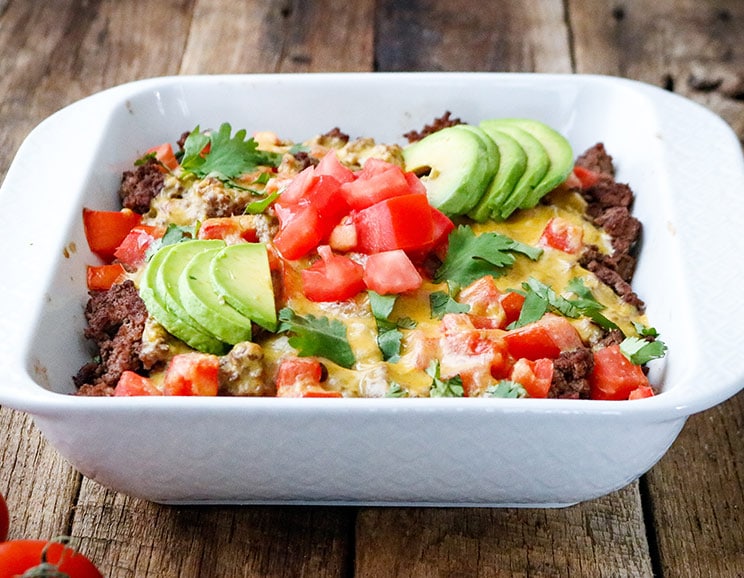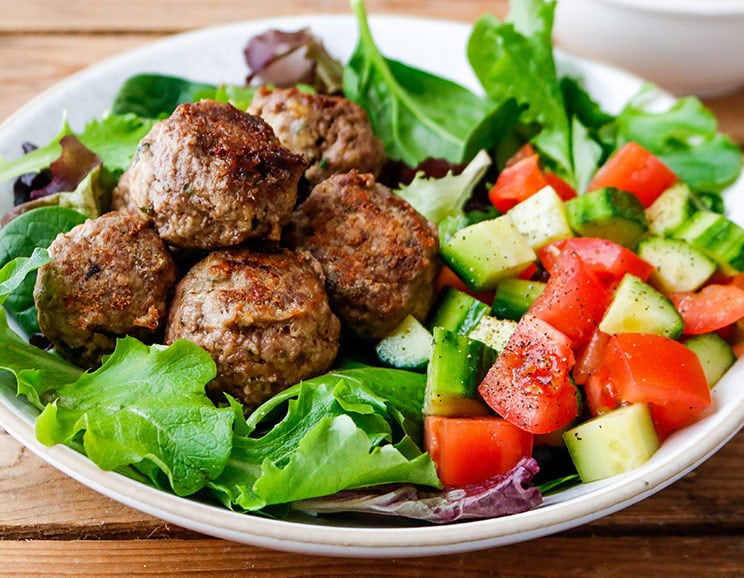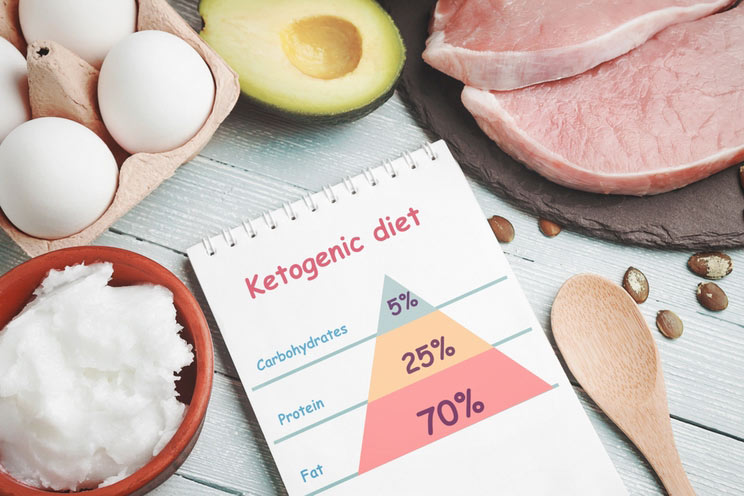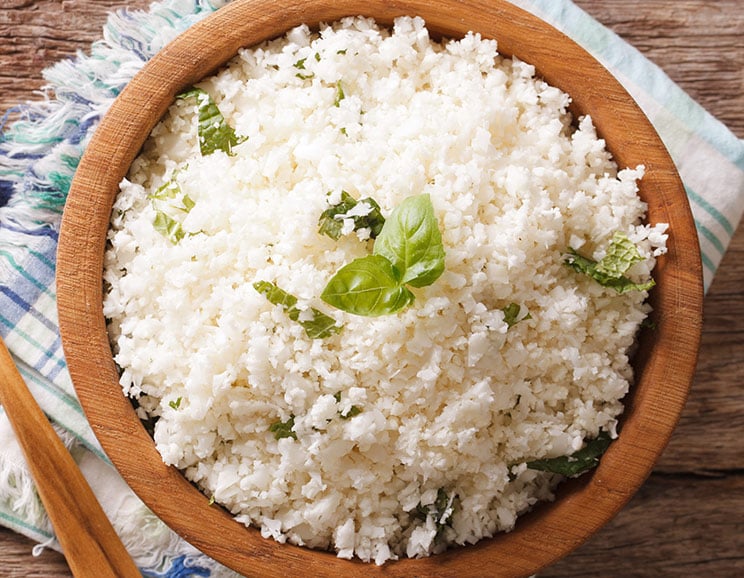If you struggle with lupus or other autoimmune disorders, a keto diet might be able to help calm inflammation and quell symptoms. Here’s how.
Going keto is an effective way to lose weight, heal the gut, and reduce inflammation – all useful for helping those with autoimmune disorders.
Here’s how it works: The keto diet is extremely high in fat, moderate in protein, and ultra-low in carbs. The goal is to switch your body to rely on ketone bodies for fuel instead of glucose. As a result, the keto diet can help balance blood sugar and promote weight loss which can, in turn, help fight all sorts of disorders. (1, 2)
Curious about ketosis?
Click here to get the FREE Easy Keto Guide to learn the right way to go keto!
Here’s how going keto might be able to help with lupus, and what else to eat (or avoid).
What is Lupus?
Lupus is an autoimmune disorder of the connective tissue that can affect your nervous system, heart, kidneys, reproductive organs, and even your blood. (3)
It most commonly affects women in their reproductive years, affecting women nine times more than men, but can also be found in men and older women. (4, 5) Lupus can look different from one person to the next, with the level of symptom severity varying as well as the organs affected. Like most autoimmune disorders, symptoms and flare-ups can be triggered by stress. (6)
Symptoms associated with lupus often include: (7, 8)
- Fatigue and tiredness, often extreme
- Headaches
- Swollen and painful joints
- Fever
- Anemia
- Swelling around the eyes, feet, hands, and legs
- Chest pain when breathing deeply
- A butterfly-shaped rash on the cheeks and nose
- Sensitivity to sunlight
- Hair loss
- Abnormal blood clotting
- Poor circulation
- Ulcers in the mouth or nose
4 Ways Keto Might Help Lupus

With all of the recent focus on the keto diet, many are asking if keto might be a therapeutic diet for lupus and other autoimmune disorders.
While keto might not directly help lupus, it can adjust your health in a few ways that can be useful when fighting autoimmunity. Here’s how.
1. Weight Loss
If you’re overweight, losing weight can help address some aspects of lupus, like low energy levels and pain, and low-glycemic diets or low-calorie diets (like keto) are especially effective at reducing fatigue. (9)
2. Improves Heart Health
Lipids like triglycerides and cholesterol are widely regarded as risk factors for heart disease. Fortunately, keto can also reduce cardiovascular risk factors by lowering triglyceride levels. While cholesterol doesn’t increase in response to dietary intake, triglycerides get higher with diets that are rich in processed foods, sugar, and starchy carbs. Keto’s heart-healthy benefits are great for lupus since the disease can affect long-term heart health. (10)
3. Reduces Inflammation
Adopting a keto lifestyle can also reduce inflammation in the body, which can worsen autoimmunity. At the same time, keto helps to boost glutathione, the “mother of all antioxidants”, which works against oxidative damage in the cells and can help to reverse autoimmune flares. (11, 12)
4. Improves Gut Health
Ultimately, a diet addressing lupus needs to focus on microbiome health, since bacterial imbalance is a primary trigger for autoimmune lupus flares. (13) Because keto eliminates many foods that can trigger gut problems, like grains, high-carb foods, legumes, and sugar, there are multiple elements of a ketogenic diet which also promote therapeutic benefits for those who have lupus.
Keto also includes grass-fed meats and bone broth, which contain lots of collagen. Collagen helps to heal and restore gut tissue, including the mucosal lining of the intestinal wall, thanks to the presence of the amino acid glycine. (14)
Keto Foods That Support Lupus

While there is no one specific diet for lupus, most autoimmune experts suggest a diet rich in whole foods and nutrients. (15) The best foods for autoimmune disorders fight inflammation and support gut health since leaky gut and other microbiome disorders are often triggers in autoimmunity and flares. (16)
A keto diet can look different for people, depending on how they’re approaching it. A keto diet for lupus should include whole foods associated with anti-inflammatory health benefits for lupus, including: (17)
- Fresh vegetables
- Fresh fruits
- Wild salmon
- Grass-fed meats
- Nuts and seeds
Note: Some animal research does indicate that high-fat diets might be problematic for lupus, increasing risk factors for metabolic disorders and heart disease, which are primary causes of death for those with lupus. (18) Other research shows that a keto diet actually decreases the risk factors associated with metabolic and heart problems. (19) Always talk to your doctor before starting a new diet plan.
Bottom Line
When it comes to addressing lupus with diet, there is no single, research-backed approach to try. However, the ketogenic diet is a viable option.
Keep in mind that while keto might be beneficial for some people with lupus, it could exacerbate symptoms in others. Knowing your body is the best way to determine if the way you’re eating is helping or worsening your health situation.
Be sure to work closely with your doctor and a nutrition professional to determine if it keto has true, long-lasting effects on your overall health and autoimmunity.
(Read This Next: 15 Signs of Brain Inflammation and How The Keto Diet Can Help)



 Lemon Garlic Chicken Piccata with Artichokes
Lemon Garlic Chicken Piccata with Artichokes









Show Comments